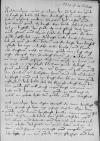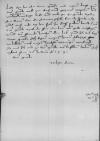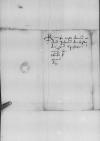Ich hab Ew(er) G(e)node dy briffe, ßo balde ich keyn Antwerp (Antwerpen, Antverpia), city in the Low Countries, from 1315 a Hanseatic port, in the 16th century the centre of Brabant’s artistic life and the wealthiest trade city in Europe, today in northern Belgium⌊AndorffAntwerp (Antwerpen, Antverpia), city in the Low Countries, from 1315 a Hanseatic port, in the 16th century the centre of Brabant’s artistic life and the wealthiest trade city in Europe, today in northern Belgium⌋ qua(m), mit eynem bothen(n) gesant, welhem ich geben(n) hab 12 stuw(n)(?) un(n)d / hab Ewern(n) G(e)node dy briffe keyn Bruges (Brugia, Brugge), city in the Low Countries, in the County of Flanders, in the 13th-15th centuries one of the most important commercial ports and trading centres in Europe, today in Belgium⌊BrükeBruges (Brugia, Brugge), city in the Low Countries, in the County of Flanders, in the 13th-15th centuries one of the most important commercial ports and trading centres in Europe, today in Belgium⌋ geßant, / un(n)d hab ym beffellen(n), her sulde dy mit ffleiß nach Ewern(n) G(e)node ffrage(n), un(n)d nyma(n)t sulde dy briffe gebe(n), de(n) Ewer G(e)node. / Alzo hot myr dy briffe wider brocht, / dornach hab ych eyne(n) andern(n) bothen(n) mit den briffe keyn Brussels (Bruxellae), city in the Low Countries, Duchy of Brabant, since the regency of Mary of Hungary the capital of the Habsburg Netherlands, today the capital of Belgium⌊BrussellBrussels (Bruxellae), city in the Low Countries, Duchy of Brabant, since the regency of Mary of Hungary the capital of the Habsburg Netherlands, today the capital of Belgium⌋ geschykt, hot myr ouch alzo vider bracht / un(n)d künde niht derffare(n), recht vo Ewer G(e)node ver / biß daß disser Stenczell, servant of Ioannes DANTISCUS (fl. 1531)⌊StenczellStenczell, servant of Ioannes DANTISCUS (fl. 1531)⌋ keyn Antwerp (Antwerpen, Antverpia), city in the Low Countries, from 1315 a Hanseatic port, in the 16th century the centre of Brabant’s artistic life and the wealthiest trade city in Europe, today in northern Belgium⌊AndorffAntwerp (Antwerpen, Antverpia), city in the Low Countries, from 1315 a Hanseatic port, in the 16th century the centre of Brabant’s artistic life and the wealthiest trade city in Europe, today in northern Belgium⌋ kume(n) ist, / un(n)d hot myr vo(n) Ewer G(e)node gesagt, daß Ew(er) G(e)node czu Bruges (Brugia, Brugge), city in the Low Countries, in the County of Flanders, in the 13th-15th centuries one of the most important commercial ports and trading centres in Europe, today in Belgium⌊BrukeBruges (Brugia, Brugge), city in the Low Countries, in the County of Flanders, in the 13th-15th centuries one of the most important commercial ports and trading centres in Europe, today in Belgium⌋, ader czu Ghent (Gent, Gand, Gandavum), city in the Low Countries, the County of Flanders, today in Belgium⌊Gen(n)ttGhent (Gent, Gand, Gandavum), city in the Low Countries, the County of Flanders, today in Belgium⌋ ist. / Szo schyke ich Ewer G(e)node dy briffe czußame(n) gebünd(en), den eyn vo(n) Bona Sforza (*1494 – †1557), Queen of Poland and Grand Duchess of Lithuania (1518-1557); the second wife of Sigismund I Jagiellon; Duchess of Bari and Rossano; daughter of Gian Galeazzo Sforza of Milan and Isabella of Aragon⌊kyniginBona Sforza (*1494 – †1557), Queen of Poland and Grand Duchess of Lithuania (1518-1557); the second wife of Sigismund I Jagiellon; Duchess of Bari and Rossano; daughter of Gian Galeazzo Sforza of Milan and Isabella of Aragon⌋ vo(n) Poland (Kingdom of Poland, Polonia)⌊Polle(n)Poland (Kingdom of Poland, Polonia)⌋ yr g(e)node, den andern(n) vo(n) Piotr Tomicki (*1464 – †1535), humanist, statesman, diplomat, one of the most trusted collaborators of King Sigismund I of Poland; 1500-1503 Chancellor of Cardinal Fryderyk Jagiellon, 1502 Gniezno Cantor, Archdeacon of Cracow, 1503-1505 servant of Jan Lubrański, Bishop of Poznań, 1504-1510 Canon of Poznań, 1506 royal scribe, 1507-1519 Grand(?) Secretary, 1509 Canon of Włocławek, 1510-1514 - of Gniezno, 1511 Custos in Kielce and Sandomierz, 1514 Bishop of Przemyśl; 1515 Crown Vice-Chancellor, 1520 Bishop of Poznań, 1523 - of Cracow; from 1524 (at least) General Collector of świętopietrze (Peter's pence), 1509 royal envoy to the Dukes of Pomerania and to Mecklenburg, 1510 - to Wallachia, 1510, 1511, 1512, 1513 - to Hungary (WYCZAŃSKI 1990, p. 268)⌊krokeschen herrn(n)Piotr Tomicki (*1464 – †1535), humanist, statesman, diplomat, one of the most trusted collaborators of King Sigismund I of Poland; 1500-1503 Chancellor of Cardinal Fryderyk Jagiellon, 1502 Gniezno Cantor, Archdeacon of Cracow, 1503-1505 servant of Jan Lubrański, Bishop of Poznań, 1504-1510 Canon of Poznań, 1506 royal scribe, 1507-1519 Grand(?) Secretary, 1509 Canon of Włocławek, 1510-1514 - of Gniezno, 1511 Custos in Kielce and Sandomierz, 1514 Bishop of Przemyśl; 1515 Crown Vice-Chancellor, 1520 Bishop of Poznań, 1523 - of Cracow; from 1524 (at least) General Collector of świętopietrze (Peter's pence), 1509 royal envoy to the Dukes of Pomerania and to Mecklenburg, 1510 - to Wallachia, 1510, 1511, 1512, 1513 - to Hungary (WYCZAŃSKI 1990, p. 268)⌋, un(n)d ouch vo(n) andern(n) herschofft, / un(n)d ouch eyn cf. Stanisław CYPSER to Ioannes DANTISCUS Antwerp, 1531-07-02, CIDTC IDL 3710⌊briffcf. Stanisław CYPSER to Ioannes DANTISCUS Antwerp, 1531-07-02, CIDTC IDL 3710⌋, den ich an Ewer G(e)node geschryben(n) hab, balde alz ich keyn Antwerp (Antwerpen, Antverpia), city in the Low Countries, from 1315 a Hanseatic port, in the 16th century the centre of Brabant’s artistic life and the wealthiest trade city in Europe, today in northern Belgium⌊AndorffAntwerp (Antwerpen, Antverpia), city in the Low Countries, from 1315 a Hanseatic port, in the 16th century the centre of Brabant’s artistic life and the wealthiest trade city in Europe, today in northern Belgium⌋ kume(n) bin. Ewer G(e)node sol voll auß meyne(n) cf. Stanisław CYPSER to Ioannes DANTISCUS Antwerp, 1531-07-02, CIDTC IDL 3710⌊briffecf. Stanisław CYPSER to Ioannes DANTISCUS Antwerp, 1531-07-02, CIDTC IDL 3710⌋ vorneme(n) mey(n) bytte un(n)d begere an Ewer G(e)node zu moll, vaß dy czebell angehett, bytte Ew(er) G(e)node um(m)b eyn entffertt.
Ouch, Genediger Her, disser Stenczell, servant of Ioannes DANTISCUS (fl. 1531)⌊StenczellStenczell, servant of Ioannes DANTISCUS (fl. 1531)⌋, der Ewer Herschafft dyner, gevest ist, hot myr gesagt, daß her kegen Ewer G(e)node un(n)d Ewern(n) Herschafft bruder eczwas gethon ßal haben(n), daß her niht bilich thue(n) sulde, / daß her yczu(n)t hoch klagt un(n)d bekentt, / un(n)d hot mich mit venende ogn(n) gebethen(n), ich ßulde Ew(er) G(e)node bytten(n), volt yn den(n) czorn(n) / un(n)d ßeyne unvornufft un(n)d vorgeben(n) und. Alzo bytte ist an Ew(er) G(e)node meyn ffleysige un(n)d hoch  BCz, 1595, p. 326 bette, szo her an Ewer G(e)node mit meyne(n) briffe que(m), Ew(er) G(e)node volt Stenczell, servant of Ioannes DANTISCUS (fl. 1531)⌊ymStenczell, servant of Ioannes DANTISCUS (fl. 1531)⌋ daß um(m)b Gocz wil vorgeben(n) un(n)d um(m)b nye superinscribed⌈nyenye superinscribed⌉ demütige bette un(n)d volt yn zu g(e)node vyder anneme(n), den der armer geselle kan dy sprohe niht un(n)d veß niht, vy her ßal zu daß Poland (Kingdom of Poland, Polonia)⌊Pollen landtPoland (Kingdom of Poland, Polonia)⌋ kume(n). Ew(er) G(e)node vyrtt derffur den lon(n) vo(n) Gotte entffangen(n) un(n)d vo(n) ffrunde(n) lewthe(n) den lob un(n)d ich vil kege(n) Ewer G(e)node alz kegen(n) meyne(n) herren(n) alleczeyt ff... illegible⌈...... illegible⌉t viliklihe(n) noch mey(n)e hechste(n) vormüge(n) vordinen.
BCz, 1595, p. 326 bette, szo her an Ewer G(e)node mit meyne(n) briffe que(m), Ew(er) G(e)node volt Stenczell, servant of Ioannes DANTISCUS (fl. 1531)⌊ymStenczell, servant of Ioannes DANTISCUS (fl. 1531)⌋ daß um(m)b Gocz wil vorgeben(n) un(n)d um(m)b nye superinscribed⌈nyenye superinscribed⌉ demütige bette un(n)d volt yn zu g(e)node vyder anneme(n), den der armer geselle kan dy sprohe niht un(n)d veß niht, vy her ßal zu daß Poland (Kingdom of Poland, Polonia)⌊Pollen landtPoland (Kingdom of Poland, Polonia)⌋ kume(n). Ew(er) G(e)node vyrtt derffur den lon(n) vo(n) Gotte entffangen(n) un(n)d vo(n) ffrunde(n) lewthe(n) den lob un(n)d ich vil kege(n) Ewer G(e)node alz kegen(n) meyne(n) herren(n) alleczeyt ff... illegible⌈...... illegible⌉t viliklihe(n) noch mey(n)e hechste(n) vormüge(n) vordinen.
Domit ich mich yn Ew(er) G(e)node vil beffollen(n) haben(n).
 BCz, 1595, p. 326 bette, szo her an Ewer G(e)node mit meyne(n) briffe que(m), Ew(er) G(e)node volt
BCz, 1595, p. 326 bette, szo her an Ewer G(e)node mit meyne(n) briffe que(m), Ew(er) G(e)node volt 

